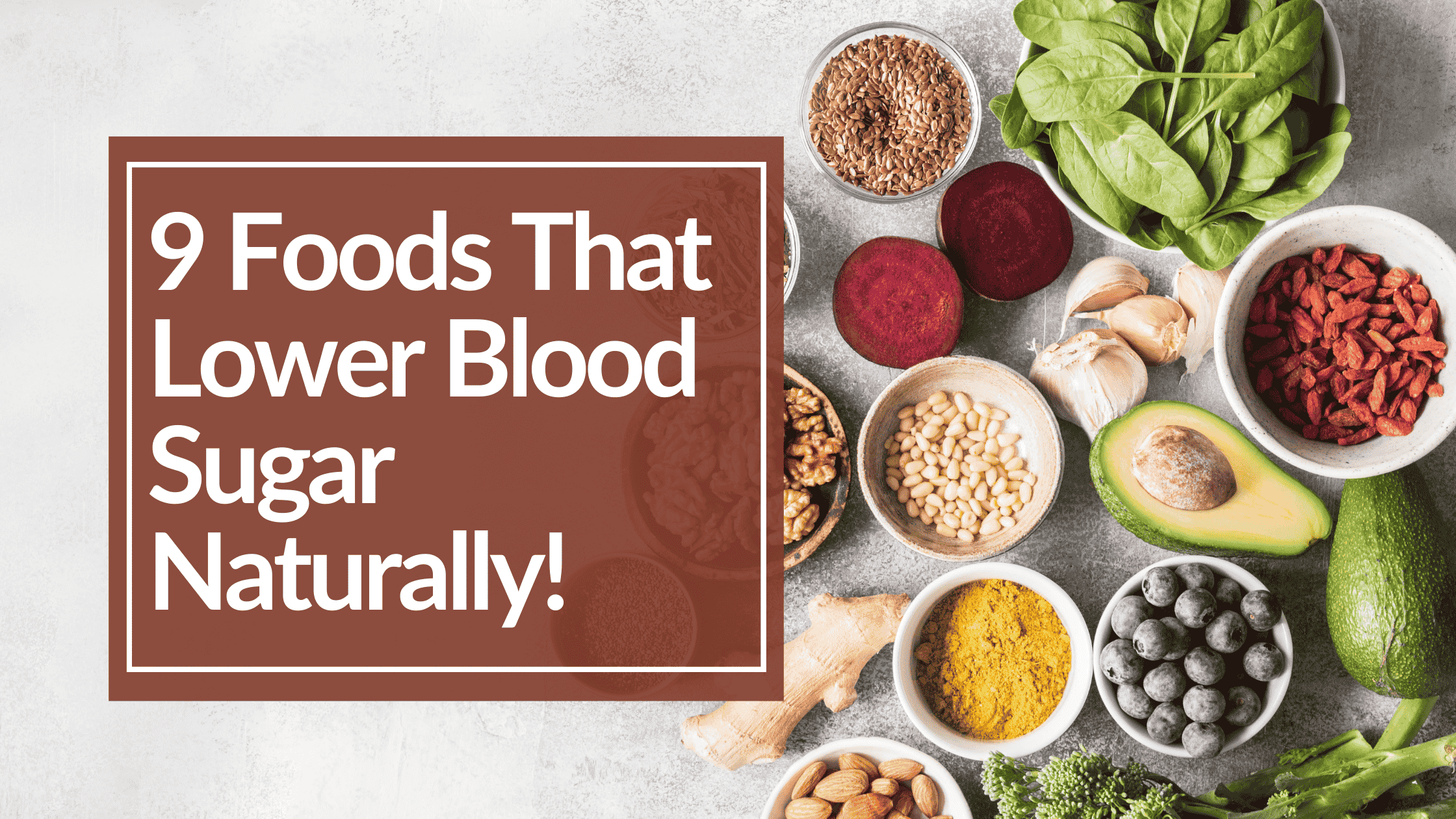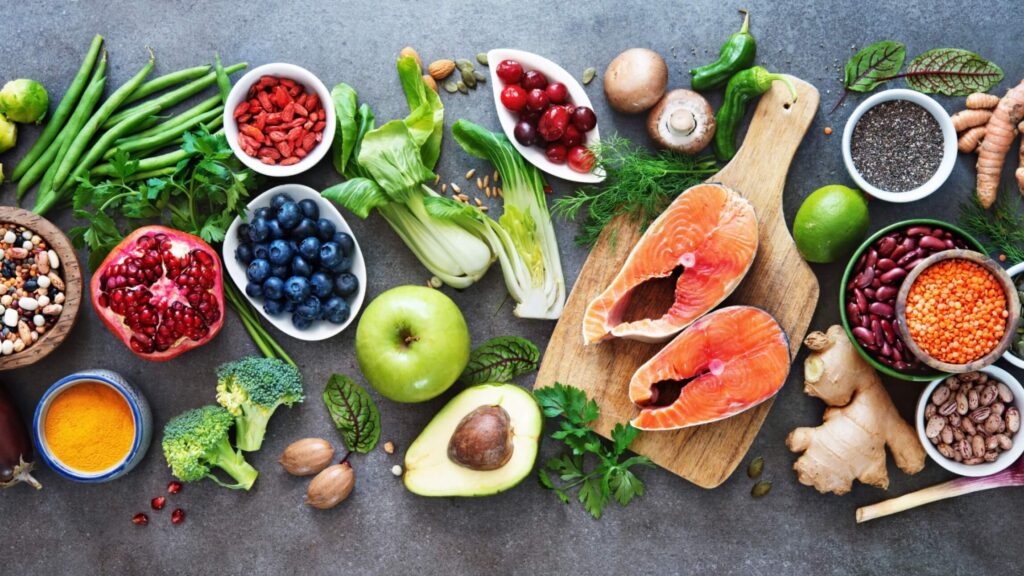
Foods that Lower Blood Sugar Naturally!
Can you manage or lower blood sugar naturally? We are all becoming more aware that managing your blood sugar levels is important for maintaining a healthy lifestyle, no matter your age.
There are so many things that play a role in having balanced, or lower blood sugar. This includes:
- Your diet
- Your stress levels
- Caffeine
- Exercise and activity
- Your oral health
This post will share 9 foods that lower blood sugar naturally because your diet is an important part of lower blood sugar levels in your quest of creating balanced health. Incorporating foods that lower blood sugar naturally into your diet can help you keep your blood sugar levels under control. This can be part of a holistic way to keep your blood sugar balanced, even through the holidays!
Lower Blood Sugar Naturally Through Diet
Blood sugar levels refer to the amount of glucose in your bloodstream. Glucose is a type of sugar that your body uses for energy. When you eat food, your body breaks down carbohydrates into glucose, which is then absorbed into your bloodstream. Insulin, a hormone produced by your Pancreas, helps move glucose from your bloodstream into your cells, where it is used for energy.
Some folks are concerned about a bioenergetic reason for High Insulin on the CBH reports they receive, after completing a Full Scan or Balancing Scan.
Keep in mind that our bioenergetics process reads energetic areas of stress in the body, through your hair and saliva. Hormone readings that are low or high, are related to energy, and not like a blood sample or urine test. If you have a reading of high insulin, this does not mean that you are diabetic. We do not diagnose or treat disease at CBH Energetics, formerly known as Creating Balanced Health. We DO look for stressors that may be pushing insulin energetically high or low. Things like over-exercising, emotional stress, or a bacterial imbalance may affect the energetic reading of insulin.
If we were speaking about diabetes, this would be where the body is unable to produce enough insulin, or use insulin effectively, leading to high blood sugar levels. High blood sugar levels can cause several health complications, including nerve damage, kidney damage, and vision problems. This is more of an end stage of high blood sugar, and there are many reasons for this, including genetics.
You are here learning about this to empower yourself, so don’t fret!
We’ll help you learn more about managing or lowering your blood sugar, as part of this article.
A healthy diet plays a big role in regulating your blood sugar levels. By incorporating foods that lower blood sugar naturally into your diet, you can work towards keeping your blood sugar levels under control.

How do foods lower blood sugar naturally?
Foods that lower blood sugar levels contain nutrients that help slow down the absorption of glucose into your bloodstream. These foods also help improve insulin sensitivity, making it easier for your body to use insulin effectively.
Think of looking at your food like a balanced plate. Protein, Fat. Fiber and Carbohydrates.
Yes, there are many ways of eating out there, and they all can look GREAT! What’s the best way of eating? The way that fits YOU individually. We have thoughts on that, and they’re at the end of this article!
Protein
Protein is needed to build muscle, and it provides nutrients like amino acids that feed body processes. Protein takes a while to break down and digest, slowing blood sugar spikes into the bloodstream. There are many different ways to incorporate protein into your daily diet, and our practitioners often stress the importance of consuming adequate protein at breakfast.
Fiber
Foods that are high in fiber, such as whole grains, fruits, and vegetables, have been known to help lower blood sugar levels. Fiber slows down the absorption of glucose into your bloodstream, preventing sudden spikes in blood sugar levels. Having adequate fiber also helps your foundation of natural detoxification, and that is DRAINAGE.
Eliminating things from your digestive tract happens with adequate hydration and fiber. Keeping the bowels regular helps to bind toxins, and you should NOT start a deeper detox without paying attention to your foundation of drainage.
Fats
Foods that contain healthy fats, such as nuts and seeds, can also help regulate blood sugar levels. The key is balance here. Again, we know there are different opinions on a high fat diet, but for general information purposes, think about incorporating a small source of fat at every meal to support blood sugar balance.
If you have diabetes, incorporating foods that lower blood sugar naturally could help to manage it more effectively.
Let’s take a look at the top 9 foods that can lower blood sugar levels.
9 Superfoods That Lower Blood Sugar Naturally
Leafy greens
Leafy greens, such as spinach, kale, and collard greens, are packed with nutrients that can help lower blood sugar levels. These greens are low in calories and high in fiber, making them an excellent addition to a blood sugar-friendly diet.
Leafy greens are also rich in magnesium, a mineral that plays a crucial role in regulating blood sugar levels. Magnesium helps improve insulin sensitivity, making it easier for your body to use insulin effectively. Incorporating leafy greens into your diet could help you manage your blood sugar levels effectively.
Berries
Berries, such as blueberries, strawberries, and raspberries, are packed with nutrients that can help lower blood sugar levels. Berries are low in calories and high in fiber, making them an excellent addition to a blood sugar-friendly diet.
Berries are also rich in antioxidants, which help protect your cells from damage caused by free radicals. Do you know what free radicals are? They are part of an oxidation reaction that happens in the body, and we need antioxidants in balance, to detoxify free radicals.
The antioxidants in berries can help improve insulin sensitivity, making it easier for your body to use insulin effectively. Incorporating berries into your diet could help you manage your blood sugar levels effectively.
Whole grains
Grains are a controversial subject. Some people do well on minimal grains, some need grains for energy, and others are in between. That’s ok, and truly why we say TEST DON’T GUESS! Whole grains, such as brown rice, quinoa, and oatmeal, are still packed with nutrients that can help lower blood sugar levels. Whole grains are high in fiber, which helps slow down the absorption of glucose into your bloodstream.
Whole grains are also rich in that magnesium, which also regulates muscle and nerve function.
Nuts
Can nuts and seeds be part of a blood sugar friendly eating plan? Yes, they can, nuts and seeds, such as almonds, walnuts, and chia seeds, are packed with nutrients that could help lower blood sugar levels. Nuts and seeds are high in healthy fats, which help improve insulin sensitivity, making it easier for your body to use insulin effectively.
Nuts and seeds are also rich in fiber. With 30 grams of almonds there is approximately 10 grams of fiber!
Fiber helps slow down the absorption of glucose into your bloodstream.
Legumes
Legumes, such as beans, lentils, and chickpeas, are packed with nutrients that can help lower blood sugar levels. Legumes are high in fiber, which helps slow down the absorption of glucose into your bloodstream.
Legumes have sources of protein, which can help you feel fuller for longer, preventing sudden spikes in blood sugar levels.
Fatty Fish
Salmon, sardines, and tuna (within reason), are packed with nutrients that could help lower blood sugar levels. Fish is high in omega-3 fatty acids, which help with your Nervous System and Cellular Metabolism, along with blood sugar balance. In your approach to creating balanced health did you resonate with stress in either of these areas on your CBH Energetics Scan?
Fish is also low in calories and a rich protein source.
Cinnamon
Cinnamon contains compounds that can help lower blood sugar levels, but … you need to chose Ceylon Cinnamon. This article here talks about the propertied of cinnamon and blood glucose.
Apple Cider Vinegar
Apple cider vinegar does have science behind it, as far as blood sugar balance. It is an inexpensive and easy way to add some blood sugar support to your diet. Read more about Apple Cider Vinegar.
Garlic
Garlic is up there with Ginger as our favorite superfoods! Eating raw garlic may help with insulin sensitivity, as shown in animal models, in this article here. There is a discussion about oxidative stress and the connection between insulin sensitivity, and garlic, like ginger, has antioxidant properties and all round natural detoxification support!
Too many foods to try?
If you’re not used to eating some of these foods, that’s ok! Start by adding a different green to your salad, or adding in berries if you rarely eat fruit. Berries can top your oats, and greens can be incorporated into a smoothie!
If your intake of simple carbohydrates is high, just experiment with different whole grains. Try wild rice instead of white rice, for example. Quinoa is also a versatile seed that can be used hot or cold.
You can also incorporate nuts and seeds into your diet by adding them to your oatmeal or smoothies as well. Legumes can be added to soups, stews, and salads, while fish can be grilled or baked for a healthy and delicious meal.
Top Takeaways to Lower Blood Sugar Naturally.
Managing your blood sugar levels is important for Cardiovascular Health and Nervous System Health. By incorporating foods that lower blood sugar naturally into your diet, you can keep your blood sugar levels under control. Balancing protein, fat, and fiber is important to balanced blood sugar.
Experiment with all options here, the leafy greens, berries, whole grains, nuts and seeds, legumes, and if you do NOT like fish, consider a fish oil supplement. Our fav is Omega Gold for every day supplementation.
Combine your apple cider vinegar with garlic and a plant oil, and you have a salad dressing that can also help regulate blood sugar levels.
By making small changes to your diet, you can enjoy delicious foods that help regulate your blood sugar levels naturally. If you struggle with change, book a call with one of our practitioners. They’re trained to help you make sustainable shifts in your health!